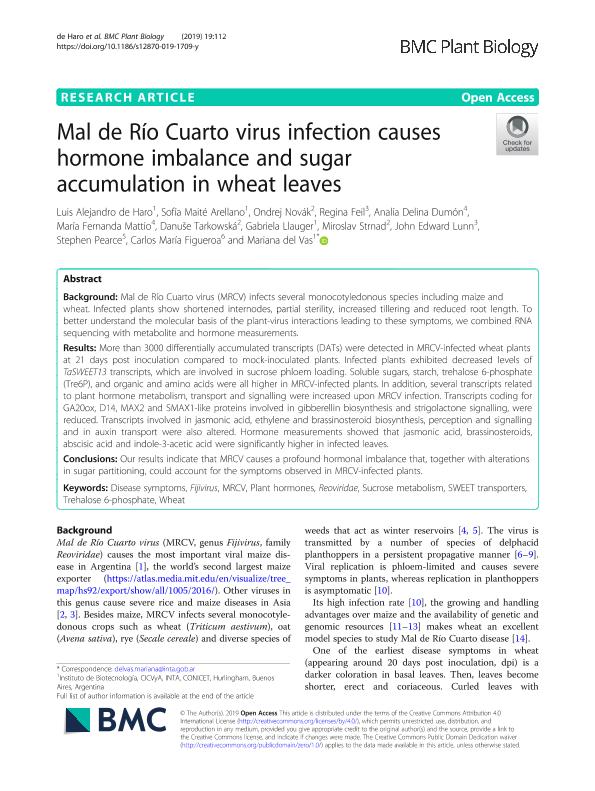Mostrar el registro sencillo del ítem
dc.contributor.author
de Haro, Luis Alejandro

dc.contributor.author
Arellano, Sofía Maité

dc.contributor.author
Novák, Ondrej
dc.contributor.author
Feil, Regina
dc.contributor.author
Dumón, Analía Delina

dc.contributor.author
Mattio, Maria Fernanda

dc.contributor.author
Tarkowská, Danuse
dc.contributor.author
Llauger, Gabriela

dc.contributor.author
Strnad, Miroslav
dc.contributor.author
Lunn, John E.
dc.contributor.author
Pearce, Stephen
dc.contributor.author
Figueroa, Carlos Maria

dc.contributor.author
del Vas, Mariana

dc.date.available
2020-11-22T15:13:54Z
dc.date.issued
2019-03
dc.identifier.citation
de Haro, Luis Alejandro; Arellano, Sofía Maité; Novák, Ondrej; Feil, Regina; Dumón, Analía Delina; et al.; Mal de Río Cuarto virus infection causes hormone imbalance and sugar accumulation in wheat leaves; BioMed Central; BMC Plant Biology; 19; 1; 3-2019
dc.identifier.issn
1471-2229
dc.identifier.uri
http://hdl.handle.net/11336/118743
dc.description.abstract
Background: Mal de Río Cuarto virus (MRCV) infects several monocotyledonous species including maize and wheat. Infected plants show shortened internodes, partial sterility, increased tillering and reduced root length. To better understand the molecular basis of the plant-virus interactions leading to these symptoms, we combined RNA sequencing with metabolite and hormone measurements. Results: More than 3000 differentially accumulated transcripts (DATs) were detected in MRCV-infected wheat plants at 21 days post inoculation compared to mock-inoculated plants. Infected plants exhibited decreased levels of TaSWEET13 transcripts, which are involved in sucrose phloem loading. Soluble sugars, starch, trehalose 6-phosphate (Tre6P), and organic and amino acids were all higher in MRCV-infected plants. In addition, several transcripts related to plant hormone metabolism, transport and signalling were increased upon MRCV infection. Transcripts coding for GA20ox, D14, MAX2 and SMAX1-like proteins involved in gibberellin biosynthesis and strigolactone signalling, were reduced. Transcripts involved in jasmonic acid, ethylene and brassinosteroid biosynthesis, perception and signalling and in auxin transport were also altered. Hormone measurements showed that jasmonic acid, brassinosteroids, abscisic acid and indole-3-acetic acid were significantly higher in infected leaves. Conclusions: Our results indicate that MRCV causes a profound hormonal imbalance that, together with alterations in sugar partitioning, could account for the symptoms observed in MRCV-infected plants.
dc.format
application/pdf
dc.language.iso
eng
dc.publisher
BioMed Central

dc.rights
info:eu-repo/semantics/openAccess
dc.rights.uri
https://creativecommons.org/licenses/by-nc-sa/2.5/ar/
dc.subject
DISEASE SYMPTOMS
dc.subject
FIJIVIRUS
dc.subject
MRCV
dc.subject
PLANT HORMONES
dc.subject
REOVIRIDAE
dc.subject
SUCROSE METABOLISM
dc.subject
SWEET TRANSPORTERS
dc.subject
TREHALOSE 6-PHOSPHATE
dc.subject
WHEAT
dc.subject.classification
Bioquímica y Biología Molecular

dc.subject.classification
Ciencias Biológicas

dc.subject.classification
CIENCIAS NATURALES Y EXACTAS

dc.title
Mal de Río Cuarto virus infection causes hormone imbalance and sugar accumulation in wheat leaves
dc.type
info:eu-repo/semantics/article
dc.type
info:ar-repo/semantics/artículo
dc.type
info:eu-repo/semantics/publishedVersion
dc.date.updated
2020-11-20T20:00:29Z
dc.journal.volume
19
dc.journal.number
1
dc.journal.pais
Reino Unido

dc.journal.ciudad
Londres
dc.description.fil
Fil: de Haro, Luis Alejandro. Consejo Nacional de Investigaciones Científicas y Técnicas. Oficina de Coordinación Administrativa Ciudad Universitaria. Instituto de Fisiología, Biología Molecular y Neurociencias. Universidad de Buenos Aires. Facultad de Ciencias Exactas y Naturales. Instituto de Fisiología, Biología Molecular y Neurociencias; Argentina
dc.description.fil
Fil: Arellano, Sofía Maité. Instituto Nacional de Tecnología Agropecuaria. Centro de Investigación En Ciencias Veterinarias y Agronómicas. Instituto de Agrobiotecnología y Biología Molecular. Consejo Nacional de Investigaciones Científicas y Técnicas. Oficina de Coordinación Administrativa Parque Centenario. Instituto de Agrobiotecnología y Biología Molecular; Argentina
dc.description.fil
Fil: Novák, Ondrej. Univerzita Palack; República Checa
dc.description.fil
Fil: Feil, Regina. Max Planck Institute Of Molecular Plant Physiology; Alemania
dc.description.fil
Fil: Dumón, Analía Delina. Instituto Nacional de Tecnologia Agropecuaria. Centro de Investigaciones Agropecuarias. Unidad de Fitopatologia y Modelizacion Agricola. - Consejo Nacional de Investigaciones Cientificas y Tecnicas. Centro Cientifico Tecnologico Conicet - Cordoba. Unidad de Fitopatologia y Modelizacion Agricola.; Argentina
dc.description.fil
Fil: Mattio, Maria Fernanda. Instituto Nacional de Tecnología Agropecuaria. Centro de Investigación en Ciencias Veterinarias y Agronómicas. Instituto de Fitopatología y Fisiología Vegetal; Argentina
dc.description.fil
Fil: Tarkowská, Danuse. Univerzita Palack; República Checa
dc.description.fil
Fil: Llauger, Gabriela. Consejo Nacional de Investigaciones Científicas y Técnicas; Argentina
dc.description.fil
Fil: Strnad, Miroslav. Univerzita Palack; República Checa
dc.description.fil
Fil: Lunn, John E.. Max Planck Institute Of Molecular Plant Physiology; Alemania
dc.description.fil
Fil: Pearce, Stephen. State University of Colorado - Fort Collins; Estados Unidos
dc.description.fil
Fil: Figueroa, Carlos Maria. Consejo Nacional de Investigaciones Científicas y Técnicas. Centro Científico Tecnológico Conicet - Santa Fe. Instituto de Agrobiotecnología del Litoral. Universidad Nacional del Litoral. Instituto de Agrobiotecnología del Litoral; Argentina
dc.description.fil
Fil: del Vas, Mariana. Instituto Nacional de Tecnología Agropecuaria. Centro de Investigación En Ciencias Veterinarias y Agronómicas. Instituto de Agrobiotecnología y Biología Molecular. Consejo Nacional de Investigaciones Científicas y Técnicas. Oficina de Coordinación Administrativa Parque Centenario. Instituto de Agrobiotecnología y Biología Molecular; Argentina
dc.journal.title
BMC Plant Biology

dc.relation.alternativeid
info:eu-repo/semantics/altIdentifier/doi/http://dx.doi.org/10.1186/s12870-019-1709-y
Archivos asociados
